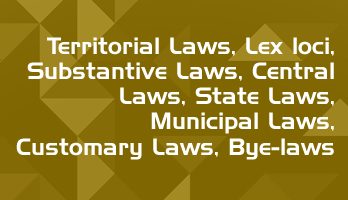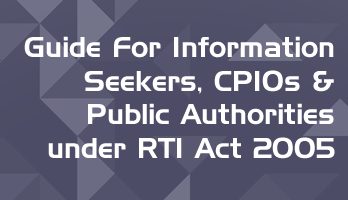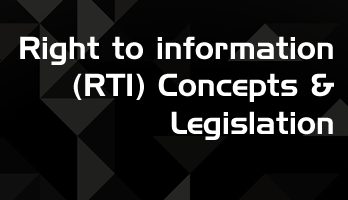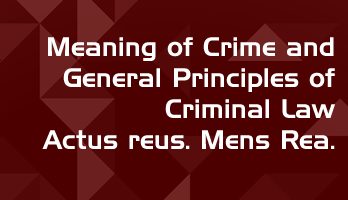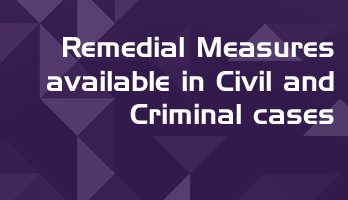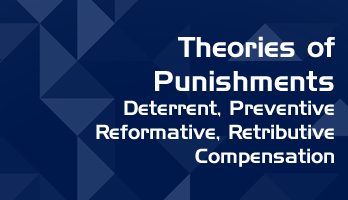Free Full Course Available on LawMint's YouTube Channel
How to Land Your Dream LLB Internship in a Top Law Firm
- Part 1 - Introduction
- Part 2 - Internship Planning
- Part 3 - Internship Research
- Part 4 - Building Your Profile
- Part 5 - The Email
- Part 6 - The Resume
- Part 7 - The Cover Letter
- Part 8 - The Interview
- Part 9 - Self Development
Practical and comprehensive course, with real examples and step-by-step analysis of the complete internship application process. Check out LawMint's YouTube channel now!
Principles of Natural Justice
Natural Justice in simple terms means the minimum standards or principles which the administrative authorities should follow in deciding matters which have the civil consequences.
There are mainly two Principles of Natural Justice which every administrative authority should follow, whether or not these are specifically provided in the relevant Acts or rules.
The two main Principles of Natural Justice are:
- ‘Nemo judex in causa sua’. No one should be made a judge in his own case.
- ‘Audi alteram partem’ means to hear the other party or no one should be condemned unheard.
The third principle of Natural Justice, which is also equally important is the no bias requirement – which means that the person making the decision in any case must act impartially when considering the matter, and must not have any relationships with anyone that could lead someone to reasonably doubt their impartiality.
Rule Against Bias
‘Bias’ means an operative prejudice whether conscious or unconscious in relation to a party or issue. Therefore, the ‘Rule Against Bias’ strikes against those factors which may improperly influence a judge in arriving at a decision in any particular case.
The requirement of this principle is that the judge must be impartial and must decide the case objectively on the basis of the evidence on record. Therefore, if a person, for whatever reason, cannot take an objective decision on the basis of evidence on record he shall be said to be biased.
A person cannot take an objective decision in a case in which he/she has an interest for, as human psychology tells us, very rarely can people take decisions against their own interests.
This rule of disqualification is applied not only to avoid the possibility of a partial decision but also to ensure public confidence in the impartiality of the administrative adjudicatory process because not only must “No man be judge in his/her own cause” but also “justice should not only be done but should manifestly and undoubtedly be seen to be done”.
The minimal requirement of natural justice is that the authority must be composed of impartial persons acting fairly and without prejudice and bias. A decision which is a result of bias is a nullity and the trial is “Coram non-judice”.
Inference of bias, therefore, can be drawn only on the basis of factual matrix and not merely on the basis of insinuations, conjectures and surmises. Bias manifests variously and may affect the decision in a variety of ways.
Aspects or Types of Bias
Personal Bias
Personal Bias arises from a certain relationship equation between the deciding authority and the parties which incline him/her unfavourably or other-wise on the side of one of the parties before him/her. Such equation may develop out of varied forms of personal or professional hostility or friendship. How-ever, no exhaustive list is possible.
In a case, the Supreme Court quashed the selection list prepared by the Departmental Promotion Committee which had considered the confidential reports of candidates prepared by an officer, who himself was a candidate for promotion.
However, in order to challenge administrative action successfully on the ground of ‘personal bias’, it is essential to prove that there is a “reasonable suspicion of bias” or a “real likelihood of bias”. “Reasonable suspicion” test looks mainly to outward appearance, and “real likelihood” test focuses on the court’s own evaluation of possibilities; but in practice the tests have much. in common with one another and in the vast majority of cases they will lead to the same result.
In this area of bias, the real question is not whether a person was biased. It is difficult to prove the state of mind of a person. Therefore, what the Courts see is whether there is reasonable ground for believing that the deciding officer was likely to have been biased.
In deciding the question of bias judges have to take into consideration the human possibilities and the ordinary course of human conduct. But there must be real likelihood of bias and not mere suspicion of bias before the proceedings can be quashed on the ground that the person conducting the proceedings is disqualified by bias.
The apprehension must be judged from a healthy, reasonable and average point of view and not on mere apprehension and vague suspicion of whimsical, capricious and unreasonable people.
Pecuniary Bias
The judicial approach is unanimous and decisive on the point that any financial interest, howsoever small it may be, would vitiate administrative action. The disqualification will not be avoided by non-participation of the biased member in the proceedings if he/she was present.
The Supreme Court in a case quashed the decision of the Textbook Selection Committee because some of its members were also authors of books which were considered for selection when the decision was reached.
Subject Matter Bias
Those cases fall within this category where the deciding officer is directly, or otherwise, involved in the subject matter of the case. Here again mere involvement would not vitiate the administrative action unless there is a real likelihood of bias.
In a case the Supreme Court quashed the decision of the Andhra Pradesh Government, nationalizing road transport on the ground that the Secretary of the Transport Department who gave hearing was interested in the subject-matter.
Departmental Bias
The problem of ‘departmental bias’ is something which is inherent in the administrative process, and if it is not effectively checked, it may negate the very concept of fairness in the administrative proceeding.
The problem of ‘departmental bias’ also arises in a different context, when the functions of judge and prosecutor are combined in the same department. It is not uncommon to find that the same department which initiates a matter also decides it, therefore, at times departmental fraternity and loyalty militates against the concept of fair hearing.
In a case, the Supreme Court quashed the notification of the Government which had conferred powers of a Deputy Superintendent of Police on the General Manager, Haryana Roadways in matters of inspection of vehicles on the ground of departmental bias.
In this case private bus operators had alleged that the General Manager of Haryana Roadways who is a rival in business in the State, cannot be expected to discharge his duties in a fair and reasonable manner he would be too lenient in inspecting the vehicles belonging to his own department.
The reason for quashing the notification according to the Supreme Court was the conflict between the duty and the interest of the department and the consequential erosion of public confidence in administrative justice.
Preconceived Notion Bias
‘Bias’ arising out of preconceived notions is a very delicate problem of administrative law. On the one hand, no judge as human being is expected to sit as a blank sheet of paper, on the other, preconceived notions would vitiate a fair trial.
The problem of bias arising from preconceived notions may have to be disposed of as an inherent limitation of the administrative process It is useless to accuse a public officer of bias merely because he is predisposed in favour of some policy in the public interest.
Bias would also not disqualify an officer from taking an action if no other person is competent to act in his place. This limitation is grounded on the doctrine of necessity.
However, the term ‘bias’ must be confined to its proper place If ‘bias’ arising out of preconceived notions means the total absence of preconceptions in the mind of the judge, then no one has ever had a fair trial and no one ever will.
Therefore, unless the strength of the preconceived notions is such that it has the capacity of foreclosing the mind of the judge, administrative action would not be vitiated.
Questions
Define the term ‘Bias’.
The term ‘Bias’ means an operative prejudice whether conscious or unconscious in relation to a party or issue.
Give one example each of any three types of bias
(a) ‘Pecuniary Bias’- The adjudicating officer has shares in one of the companies.
(b) ‘Subject-matter Bias’ – A person who is the member of the selection panel is also one of the applicants for the post.
(c) ‘Departmental Bias’ – An officer of the government Transport company authorized to inspect the government and private vehicle.
List the various aspects or types of ‘Bias’.
Various aspects of ‘Bias’ are:
(a) Personal Bias
(b) Pecuniary Bias
(c) Subject Matter Bias
(d) Preconceived Notion bias and
(e) Departmental Bias
Free Full Course Available on LawMint's YouTube Channel
How to Land Your Dream LLB Internship in a Top Law Firm
- Part 1 - Introduction
- Part 2 - Internship Planning
- Part 3 - Internship Research
- Part 4 - Building Your Profile
- Part 5 - The Email
- Part 6 - The Resume
- Part 7 - The Cover Letter
- Part 8 - The Interview
- Part 9 - Self Development
Practical and comprehensive course, with real examples and step-by-step analysis of the complete internship application process. Check out LawMint's YouTube channel now!
Acknowledgement : This article is adapted from Swayam-NIOS course material.



